Thin privilege in fit communities: What is it? And what can we do with it?
The other week I posted a photo on my Instagram and Facebook that received a lot of likes and comments. It was a selfie of me wearing a new leotard that I had just gotten.
My commentary was as follows: Just got my new custom @yumikoworld leotard in the mail today! ???? Hoping this will encourage me to get back in ballet class more often. Other thoughts: 1. The back of this leo is so pretty—and my back looks like it’s built more for heavy lifting than graceful port de bras. I’m cool with that. 2. It fits surprisingly well. Leotards never worked out well for me but this one is awesome. 3. This is the largest size they carry. I’m cool with that too, but is it really? #dancerscomeinallsizes so where are the rest of them? Everyone deserves to wear a leotard this nice! In the real world, I’ve got this thing called #thinprivilege but standards in the dance world are a whole different animal. I’ll blog about this soon enough…
Well I’ve been thinking about this for awhile, and now I’m finally putting it into words.
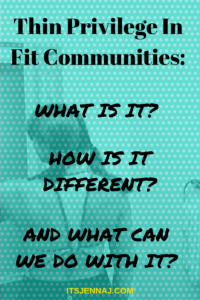 I immediately felt very torn after posting this photo. I meant it to be encouraging. A message of self-acceptance, and a call to action for dancewear companies like this one to expand their sizing. What I got in response was a bunch of likes and comments about how awesome and ripped my back looked. Unintentional #fitspo by me, that probably left some people feeling the pull to start doing more lat pulldowns. I mean, I’m a big fan of all the pulling exercises–but I never want anyone to feel shamed into doing them because they want their back to look like mine. I’ve said it before and I’ll say it again: I often feel like I’m stuck in the middle of two worlds, where I don’t quite fit in either. My Instagram feed is an eclectic mix of friends, family, fitness professionals, fat activists, and feminists, plus some cute dogs for good measure.
I immediately felt very torn after posting this photo. I meant it to be encouraging. A message of self-acceptance, and a call to action for dancewear companies like this one to expand their sizing. What I got in response was a bunch of likes and comments about how awesome and ripped my back looked. Unintentional #fitspo by me, that probably left some people feeling the pull to start doing more lat pulldowns. I mean, I’m a big fan of all the pulling exercises–but I never want anyone to feel shamed into doing them because they want their back to look like mine. I’ve said it before and I’ll say it again: I often feel like I’m stuck in the middle of two worlds, where I don’t quite fit in either. My Instagram feed is an eclectic mix of friends, family, fitness professionals, fat activists, and feminists, plus some cute dogs for good measure.
YUP. You heard that right. I am a personal trainer AND I follow fat activists.
I’ll save my full reasoning behind that for a different post, but long story short: body positivity helped me heal myself from years of disordered eating and overexercising. The body positivity movement has its roots in fat acceptance and intersectional feminism. It’s more than just white girls like me being ok with buying one size larger (straight sized) jeans. It’s an important social justice issue to explore, especially for people like me who consider themselves to be open minded and progressive towards other issues such as race, gender, religion, sexual orientation, ability, age, etc. In any case, I think it’s about time that I said what’s been brewing in my mind for awhile now:
I spend most of my days working and playing in a community of SUPER fit and thin people.
I know a lot of you who read my blog do too. This is not an accurate representation of the world at large. But it’s easy to forget when it’s all you see. The other day I was teaching a group fitness class that I teach every week, and as I looked around the room, I couldn’t help but notice the smallness of my clientele. I’d never really given it much thought before, but there were around 40 people (mostly women) in class, and most of them were probably wearing a size extra small or small leggings. They come take my class because I teach them how to do squats and pushups and make it fun. Plus I have the best playlists. 😉 But, given my more muscular/curvy build, I’m fairly certain that most of them are not coming to class so I can make them look just like me. I know this, because I’m met with much resistance and concern about becoming too “bulky” anytime I ask someone to pick up more than a 3-5lb dumbbell. Nonetheless, my students and clients are some really kind and wonderful humans.
I hang out with people who have 6 packs.
Have friends who run marathons and do ironmans. I know people who can wrap their foot around their head, and lift ridiculous amounts of weight. A lot of the people I work with do elimination diets, and drink green juices and bake vegan brownies made from black beans and raw organic honey. I take class with some of the most incredible professional dancers and teach kids who at age 15, are already far more technically gifted than I’ll ever be. I’ll admit that I’m capable of some pretty bada$$ stuff too. And if you want to make me a chickpea blondie or buy me a kale smoothie, I’m SO on board. I have the luxury of working at multiple places where I get to work out for free, and make enough money to be able to walk across the street after work and buy overpriced kombucha and sushi at Whole Foods if I want to. I love being active and I love what I do for a living. Yet I know that none of this is typical.
This is privilege.
To the most extreme extent. The word “privilege” makes a lot of people uncomfortable. It still does for me too, sometimes. But the important thing to understand, is that having thin privilege does not mean that you’ve had an easy life or that you haven’t had struggles with your body or otherwise. It doesn’t mean that you don’t still experience oppression in other areas of your life such as race, gender, or religion. It just means that you can do things like: Eat an ice cream cone in public without getting dirty looks. Fit into any seat on an airplane. Walk into almost any store and find clothing in your size. Go to the doctor and get treated for your illness or injury without being told to lose weight. And many other things! For me, this also includes buying a super cute leotard that fits me well.
At the same time, I can’t help but wonder, does thin privilege have it’s own nuances in the fit communities where I spend most of my time?
Growing up, I never liked wearing leotards because they never made ones supportive enough for girls who wore my particular bra size. All I ever wanted was to wear a leotard with a pretty back and not have to ruin the look with a sports bra underneath. These days, there are so many more options available for dancewear, and yet I find it hard to believe that I wear the largest leotard that Yumiko makes. The message this sends me: by dancer standards, I’m on the cusp of being “too big”. A few pizza nights away from having to sell my new leotard on eBay. At this point in my body acceptance journey, I’m in a good enough place to not let this stop me from eating pizza anyway. At the same time, I have to acknowledge that shopping for things like dancewear and workout clothes has to be 100x more challenging if you are plus-sized.
When I was still stuck in the diet mentality, and actively trying to lose weight (with little success), friends and family told me that I didn’t need to lose weight. My response: I’m fine. . .for a “regular person”. But not for a dancer.
I could say the same now in my jobs as a yoga teacher or personal trainer. Unlike some of my friends and co-workers, I do NOT have a 6 pack. You won’t see me participating in a bikini competition. I will never do a juice cleanse or keto. I’m not really sure what I weigh right now, and I don’t believe in BMI as an accurate measure of health, yet I’m pretty sure mine would tell me that I’m “overweight”. I’m well aware that in my line of work, I’m expected to look a certain way, and that until people get to know me, my credibility is largely based on my appearance.
Privilege has many gray areas.
It all depends on the perspective of the person looking at it.
To a fat activist: I’m a thin, white, able-bodied, cisgender woman who has never had the experience of living in a truly “fat” body.
To a professional dance company? I’m definitely “too fat” to be a ballerina, but I can squeak by as a contemporary or tap dancer as long as my technique is strong.
To the people who work and play in my little bubble of fitness: I’m just like one of them, because it’s “totally normal” to #yogaeverydamnday and drink $4 bottles of coconut water.
To people who know me well: I’m a strong, capable, and caring yoga teacher/dance teacher/personal trainer who wants everyone to stop letting diet culture BS and body image issues run their lives.
At least I think? I could be totally off here. But it’s worth talking about.
I can’t be the only person who’s ever thought about this before. And I’m not sure what to do about it. But I’m working on it. I have some ideas to start with. Because whether you are on board with every thing I just said or not, I’m sure you can agree with this:
It would be freaking awesome to be able to exist in a world where we could all just pursue the things that light us up without fear of being shamed for how we look.
So what do we do about it?
Before I begin, I’d just like to acknowledge that I might very well be thinsplaining all of this. (yes, I just made up this word) I don’t claim to have all the answers–I’m always learning. These are just my ideas today:
Be our authentic selves. Tell our stories. Human connection is so valuable.
Listen to the stories of others, especially those who are marginalized.
Use our voices to amplify their stories by sharing them and supporting their work.
Diversify our social media. And our real life social circles too.
Cast and hire talented and qualified people regardless of their appearance.
Create spaces that are welcoming for all for people who want to pursue fitness and health.
For those of us who teach and coach: learn modifications and variations that work for a variety of body types and abilities so that we are prepared and knowledgeable when they show up in our classes.
Know that if someone is not interested in that right now, it doesn’t make them less worthy of being treated like a human.
Recognize that fat shaming people isn’t helpful. Someone else’s health is nobody’s concern but their own (I realize this is really hard to accept if you love that person).
Make no assumptions about someone’s health, work ethic, fitness level, or goals based on their appearance.
Know that people of all sizes and abilities are out there doing amazing things with their bodies, even if we don’t see much of it in our real-life fit communities. Seek them out.
Acknowledge our privilege and check ourselves before we call ourselves fat. More often than not, it’s not our word to claim.
Find a different way to describe our feelings: Instead of saying “I feel fat”, dive deeper into it: what is the actual emotion there?
Consider how the things we share might affect others and have compassion. One person’s “before” shot is another persons “right now”. “After” on one person could very well look like someone else’s eating disorder.
Think before we comment on someone’s weight. Even if it’s a compliment about their weight loss, it could backfire and make them feel less worthy once they gain it back.
Remember that weight loss isn’t always inherently good. Sometimes people lose weight because they are sick or depressed.
Take care of ourselves. Give ourselves permission to rest and eat cake sometimes so that others feel they can do the same.
Be grateful to have enough food that we overeat sometimes AND to have the luxury to choose not to eat certain foods if we want.
Be open to new paradigms surrounding health and fitness. Or at the very least, take the time to completely learn about new ideas from a non-biased source before deciding we don’t agree with them.
Be open to the idea of YES AND. It’s possible for our reality AND someone else’s to be true simultaneously.
Accept that unless we’ve walked in someone else’s shoes, we can’t fully understand their experience.
Accept that to someone, we will probably always be “doing it wrong”. Do it anyway.
Align ourselves with likeminded people.
Based on the responses I’ve gotten recently from my friends and colleagues who work and play in fit communities, I’m slowly discovering that I’m not the only one who feels the way I do. Sometimes I’m not even sure what to call myself–“body positive” doesn’t feel quite right to me anymore. In the body positive community right now, there is a lot of concern that women like me with thin privilege are crowding out the voices of the people it was originally created for. I get that. AND I also don’t want to find a new career path OR spend the rest of my life shaming people who don’t look and live like I do. I love my job(s). I just see things differently. So where does that leave me? Where does that leave us? I don’t know. Let’s keep talking about this stuff anyway. It’s messy and uncomfortable, but also necessary and worth it.
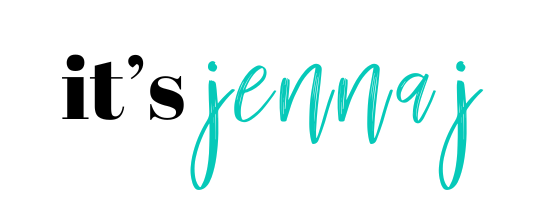
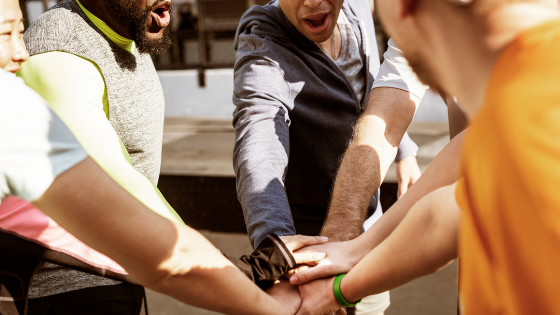
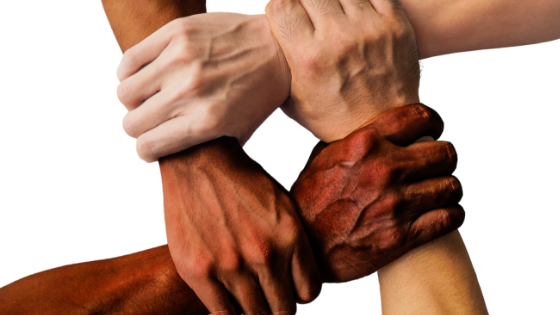
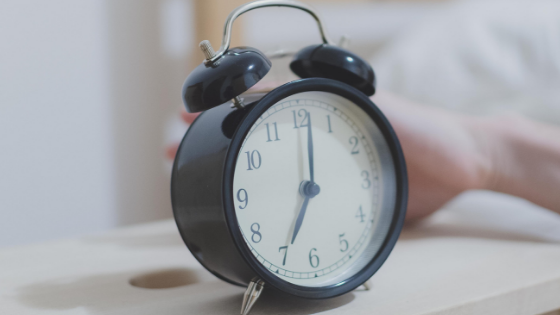
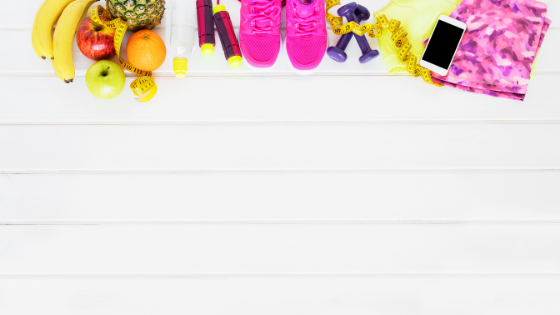
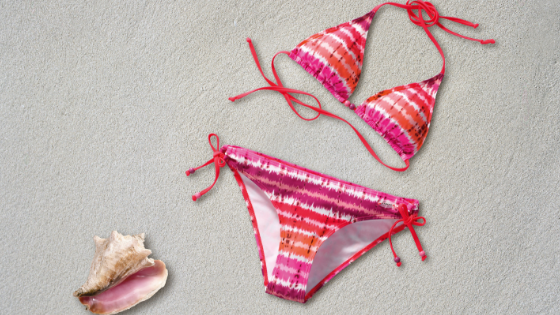
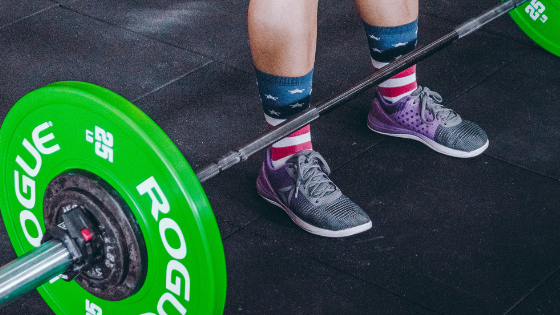
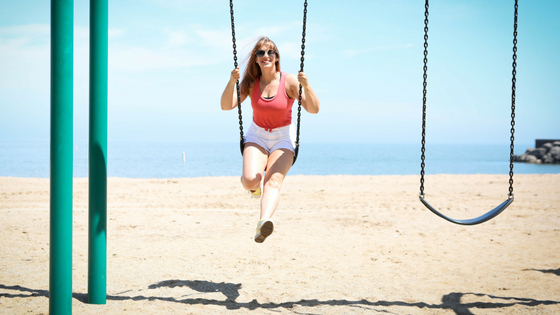
Wise words!! Luv your posts!
Thanks Katie! Love your feedback and miss your face!
Love your blog posts! And agree on so many levels! And I want to take your sculpt class so much ??❤️❤️
Thank you for reading Chrissy! Remind me again where you teach in Cali? I’m coming to Huntingon Beach in February…
So much yesss! I’ve watched my husband suffer from a mysterious illness for the last nine months and lose over 40 pounds because of it. I want him to be healthy and be with me until we are old and wrinkly. If that means that he weighs more I’ll take it! Everyone keeps cheering him on because they see him out in public and think he looks so good but what they don’t see is him sitting at home in pain, not able to eat more than half the things on a typical menu because it will make him double over in misery. I just want him to be healthy, and that isn’t synonymous with “thinner.”
Amen! Thank you for always reading and sharing. I hope he finds some solutions so he can feel good again! Sending love your way!
I feel ya. (Confession: also want my back to be as ripped as it was when I was rock climbing!) Like you, in the world at large I have thin privilege. Or almost do, and almost have fit privilege: it literally depends on what I am wearing. In the social dance circle it’s another story. I happened to converse last night with a very skilled dancer about appearance-based codes and biases, and it was nice to just be able to name them and admit that they exist. She and I both have more regret than resentment for it. (Let’s just say strangers don’t ask me to dance based on looks alone.)
At yoga? OMG. Some days I totally compensate with strength and determination. Other days I am feeling good, or even content with my limitations, and watch women do handstands on the way to chataranga with a mix of, that’s so cool, she worked hard for that, and how do you DO that? Most of those women are around my size too! So I could do it! And I feel so huge sometimes, even when feeling fit rather than fat, like I might accidentally squash a “normal” sized yogi by bumping into her. It’s ridiculous. I am normal sized! In street clothes they sell out of my size first! Where are these tiny people all coming from?
It’s so messed up right? Thanks for sharing your story with me too. It always helps to know we’re not alone in feeling this way. 🙂
I couldn’t agree more with every word you said Jenna! I definitely have/had the same issues/feelings/thoughts. It’s great to read your experiences as a dancer with a similar background to mine. I’ve accepted my past and confronted my demands within to move forward, which took years for me to do. Now I’m trying to find my voice to express and share my story, cuz like you, I want to get my story out there to help inspire others for a healthier happier lifestyle. I give you so much props for putting yourself out there! Makes me nervous to do that and actually say, I had an eating disorder (as I’m shaking typing that for the first time ever), I over exercised, I had body image issues with major low self esteem. I literally laughed out loud reading “I’m fine for a regular person, but not for a dancer.” I used to say the same thing! Thank you for sharing your stories and thoughts! You inspire me to get my story out there to begin my journey of wanting to help others.. slow work in progress. Long term goal, write an inspirational/self help book. Keep up the good work Jenna!
Thanks for reading and sharing Kara! It gets easier the more you do it. What’s crazy is that when I knew you in college I would have never thought you were dealing with the same shit as I was. We walk around like we have it all together, but far from it! I think the more we share our stories the more we realize that we’re not alone. And there are so many more people like us out there too! I can’t wait to see where this journey takes you. One day I will write a book too–long term goal for sure!